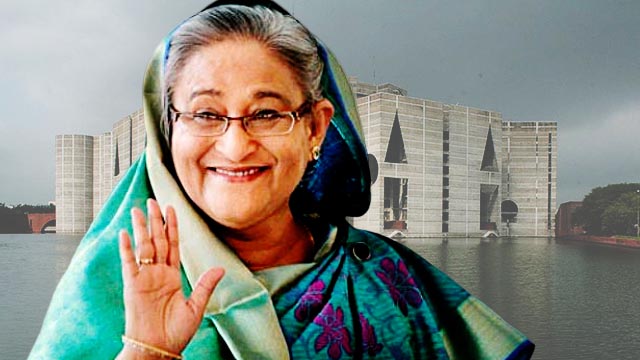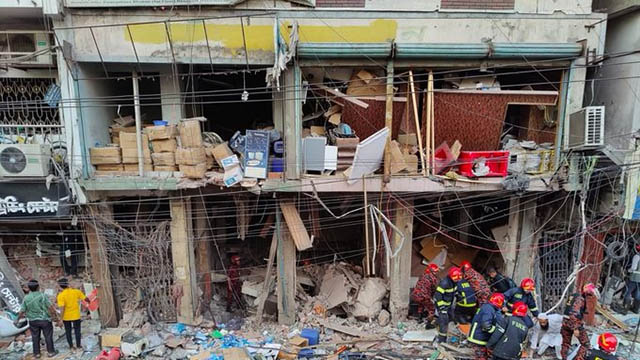Gayeshwar Chandra Roy, a senior Bangladesh Nationalist Party (BNP) leader, announced on Tuesday, May 23rd, that their party, the principal Opposition in Bangladesh, will commence the final phase of the “oust-government movement” to bring down the Awami League-led government.
Roy’s comments came at a time when both parties have locked horns and the country has been experiencing several instances of conflicts as the parliamentary elections, scheduled for later this year, approach.
In the past few weeks, there have been several skirmishes between the BNP and the police. Clashes have been reported from Dhaka, Comilla, Khulna, Barishal, and other places in the country.
Tension has escalated ever since a BNP leader allegedly issued a death threat to Prime Minister Sheikh Hasina on Friday. The Awami League has filed a case against the BNP leader of the Rajshahi division, and the latter has alleged that the government is using state terror to suppress its movement.
Roy launched a road march in front of Bangladesh Medical in Dhaka’s Dhanmondi area, he also called on the government to accept the BNP’s demand for holding the forthcoming election under a non-party caretaker government if it wishes to prevent the movement.
He stated the BNP is yet to give the final push in the movement to overthrow the government.
The BNP leader also commented the main objective of their party is to restore democracy and the people’s ownership of the country. They demand free and fair elections to ensure the people can freely elect their representatives.
Following the BNP’s march, a massive clash took place between the participants in the rally and the armed police force. The BNP workers allegedly went on a rampage in the Dhanmondi area and vandalised public transport vehicles, forcing the police to resort to violence.
The Opposition in Bangladesh has alleged that Hasina, who often accuses her opponents of plotting to reverse the victories of Bangladesh’s liberation war against Pakistan, has been rigging elections using brute force, and has monopolised power in the last 14 years, turning the country into an autocracy.
Awami League’s general secretary Obaidul Quader had rubbished the BNP’s criticism and said if the power is given to the Opposition, the spirit of Bangladesh’s liberation will ebb away. “We cannot hand over power to BNP, which is the patron of communal forces and militancy”, Qauder said in January 2023.
Derek Chollet, the US State Department Counsellor, who led a high-level seven-member delegation to Dhaka in February 2023, condemned Bangladesh for the erosion of democracy. The US has allegedly threatened Bangladesh by saying if democracy in any country, including Bangladesh, pushes beyond its limits, then the US is restricted from cooperating with that country.
Hasina, in an exclusive interview with the BBC, launched a scathing critique against the US, which had also opposed Bangladesh’s liberation war. She accused the US of harbouring a bias against her administration.
According to Hasina, the sanctions imposed on the Bangladeshi paramilitary force Rapid Action Battalion (RAB) are a reflection of that bias. Not only this, she emphasised that Bangladesh has achieved commendable progress under her rule over the past 14 years, owing it all to the unwavering commitment to the democracy of Bangladesh.
Hasina also accused the US of plotting a regime change in the country in connivance with her detractors. She stated, in the Parliament, “They are trying to eliminate democracy and introduce a government that will not have a democratic existence…It’ll be an undemocratic action.”
She also criticised the US by alleging that Washington DC does not practice democracy beyond the Atlantic Ocean. She said, “They can overthrow the government of any country…In particular, Muslim countries are going through tough situations.”
While Hasina accused the West of plotting a regime change, the BNP, whose top leaders, including former prime minister Khaleda Zia, have fled the country to evade arrest in a graft case, has accused the Awami League government of curtailing their rights to oppose.
The BNP alleged on Tuesday that the law enforcement forces encircled its office in Malopara in Rajshahi and prevented the movement of people and vehicular traffic in the area, apparently to stop its agitation programme against the government.
The government has denied the allegations and claimed that the BNP’s Rajshahi office has been surrounded in a bid to prevent some of the accused leaders of the organisation from escaping arrest. There has been a first information report (FIR) against them.
On Monday night, Awami League’s district general secretary Shariful Islam Ramzan filed an FIR against BNP secretary general Mirza Fakhrul Islam Alamgir and Rajshahi district BNP convener Abu Sayeed Chand for issuing a “death threat” against Hasina. Chand is the main accused in the case.
Earlier on Friday afternoon, Chand threatened the prime minister at a public rally in Rajshahi. He said, “No more 27- or 10-point demand, just one point now – send Sheikh Hasina to the grave! We will do whatever is necessary to get Sheikh Hasina to resign.”
According to the case statement, there is a threat to the life of Hasina.
Ramzan alleged that the prime minister was defamed as the news of the alleged threat was broadcasted by several media outlets. An amount of Tk 200m has been sought as compensation in the case.
Police and Special Weapons and Tactics (SWAT) teams are deployed at the entrance of the BNP office, restricting anyone’s entry. The owners of nearby shops were compelled to keep their shutters down, culminating in the cancellation of BNP’s scheduled march programme in Rajshahi.
In the meantime, the US Embassy in Dhaka has condemned the death threat issued to Hasina, from which the BNP has distanced itself. However, as the elections approach, it’s unlikely that either of the parties will retreat from their aggressive posture. It’s to be seen whether the South Asian country can hold peaceful and fair elections, which the critics of the government are sceptical about.


